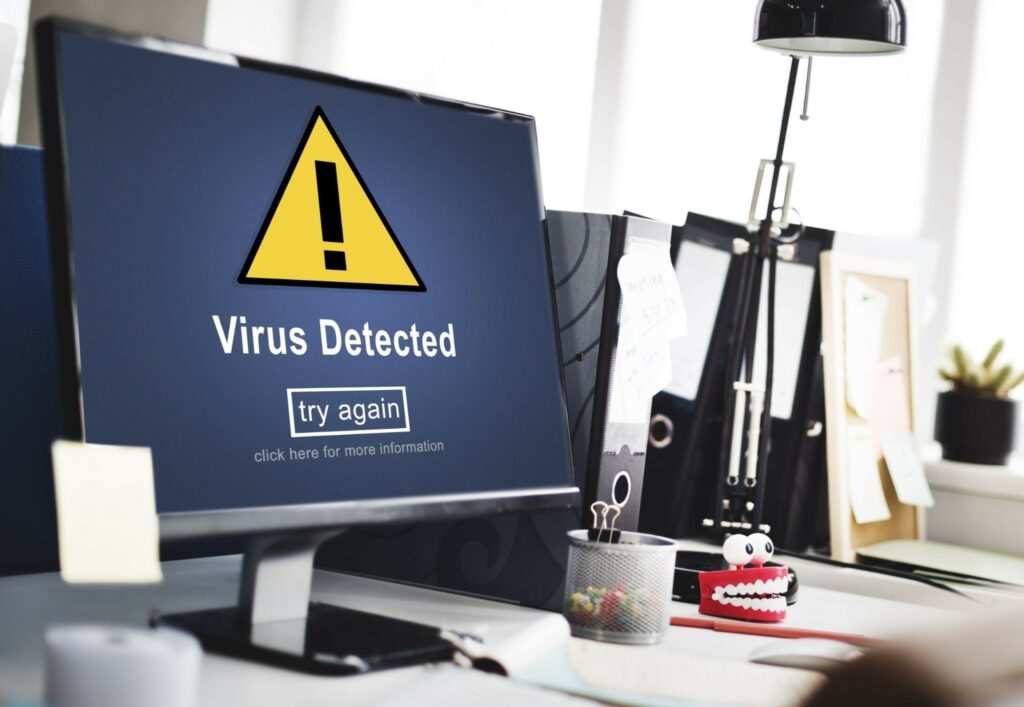Computer viruses and malware are serious business. They can cripple your ability to go online, steal your identity and data, and worse.
Many of today’s viruses are highly sophisticated and often do more than just attack your computer. In a business setting, 61% of viruses spread from one employee to another. For home users, malware can spread to connected devices or use the internet to propagate the virus to others you communicate with online.
Here are some of the newest types of computer viruses emerging in 2021. While they may have odd or funny names, take them seriously.
CoinMiner
CoinMiner uses Windows Management Instrumentation (WMI) to spread inside your system. It executes scripts to avoid detection and persist — often despite being deleted. System resources are used for crypto mining.
Ransomware as a Service
While ransomware itself isn’t new, several new versions are floating around and a new service that has spawned its own acronym: RaaS. RaaS stands for ransomware as a service and has become extremely popular with hackers. People hire expert hackers as hired guns to initiate attacks.
CryptoMix Clop
The CryptoMix Clop ransomware not only targets individual computers, but can infect any devices that are connected. This malicious attack disables weak antivirus software and encrypts your files. It changes file names and adds clop to the end, thus the name.
Cyborg Ransomware
The Cyborg ransomware is often found embedded in fake Windows 10 software updates or linked from attachments or images in emails. It’s also called the AIDS attack (Aids info Disk Trojan) in a modern-day update to malicious files that used to be stored on floppy disks. This attack is also known to replace boot files, so even if you remove the virus, it may repopulate when you restart your computer.
CryptoWall
CryptoWall is another form of ransomware that is distributed through email or links when users open ZIP attachments or click on links or fake ads.
Zeus Gameover
The virus targets financial information. Once on your system, it attempts to steal your login credentials for banks and other financial institutions to try to siphon off your funds.
Ursnif
This piece of malware goes by several names: Ursnif, Gozi, or a variant known as Dreambot. It is often distributed via a Microsoft Office document that asks users to enable Macros, which can steal credentials or connect to malicious websites.
GoBrut
This malicious piece of code scours your device for passwords and uses brute force tactics to spread itself on your computer and any network-connected devices.
Trojan Glupteba
This piece of malware embeds itself in your system software and may be exceptionally difficult to identify. Often getting onto systems by way of links in phishing emails, captures traffic to your IP address and ports to grab personal and sensitive data.
Agent Tesla
This has nothing to do with Tesla autos. This virus spies on users and deploys a keylogger to capture keystrokes to steal identities. Like RaaS, hackers can buy a subscription license to use the malware on the dark web.
Blaknight
Similar to Agent Tesla, Blaknight uses keylogging capabilities to target credentials and banking information. It’s also known by the name HawkEye.
NanoCore
This virus is downloaded via phishing emails or embedded in Excel spreadsheets. When users click on links or open spreadsheets, NanoCore allows hackers to download and execute files on your computer.
ILOVEYOU
If you get an email that includes a love letter, make sure it’s from your significant other. Otherwise, it may be the ILOVEYOU virus that’s caused more than $10 billion worth of damage already. When you click, it can lock up your computer and prevent you from booting it up in the future. Not only that, but it also grabs your email list and forwards the message to other users.
StormWorm
This nefarious virus uses real-world news headlines (or fake news headlines) to try to trick you into clicking on them. It can take over your computer and then use it to attack others.
Make Sure You Have the Best Antivirus Software
There are thousands of other malware, ransomware, and computer viruses that are lurking out on the internet. While these 14 are some of the most common viruses right now, cybercriminals and hackers are constantly updating and evolving viruses in new ways.
You need to protect yourself.
Antivirus software is essential to protect your data and devices.
- Block web threats, such as ransomware
- Stop malware and suspicious files and applications that can infect your device
- Flag suspicious phishing emails and scam websites
- Block dangerous websites that may try to steal your personal data
The amount of cybercrime happening around the world is staggering. More than 268,000 new types of malware were detected in 2020, an increase of 74% from 2019. You need robust and reliable antivirus software as the foundation for protecting yourself from cybercrime.
